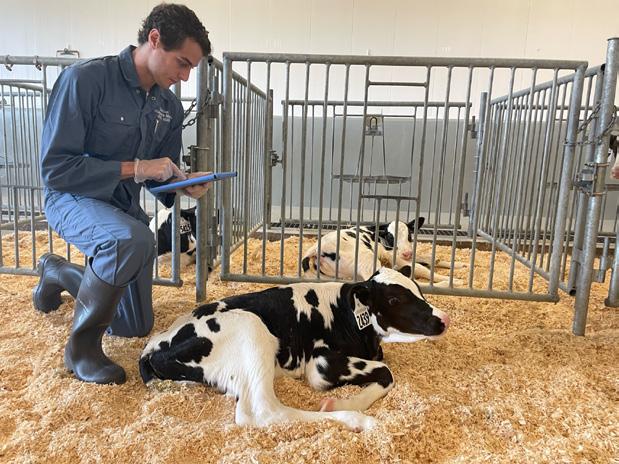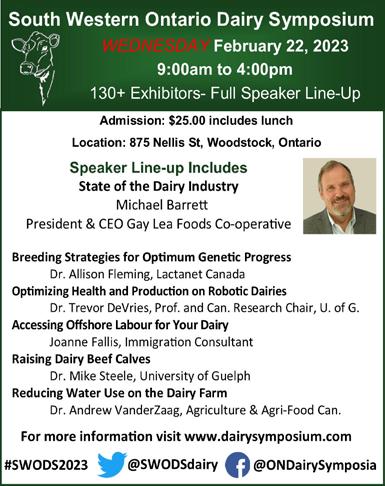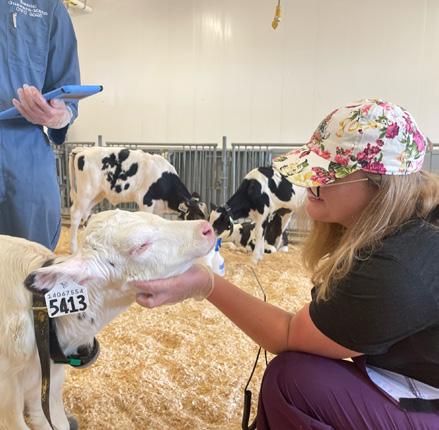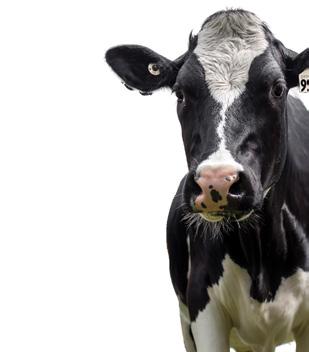
5 minute read
Digital Innovation in Vet Care
DIGITAL INNOVATION
IS REVOLUTIONIZING VETERINARY CARE
By Katie Duncan
DIGITAL TECHNOLOGY and smartphones are positively impacting preventative medicine, fuelling progress in the Canadian dairy industry. It’s all about facilitating data, connections and rapid communications. Smartphones help veterinarians access real-time data from wearable sensors and view rapid test results for infectious diseases. They enable instant conversations between mentors and mentees and facilitate consultations between producers and their veterinarians. The possibilities continue to grow as the technology evolves. “Having on-the-go access to data has pushed our practice to 80 cent preventative medicine versus curative,” says Dr. Jodi Wallace, a veterinarian and dairy farmer of a 100-cow herd in Howick, QC. “That proactive nature fosters better animal welfare by preventing animals from becoming sick and gives our practice the ability to manage whole herd health.” Smartphones and tablets are a huge difference-maker in dairy veterinary medicine, giving practitioners like Daniel Guevara-Mann, Ontario Veterinary College student, access to on-the-go data transmitted from on-farm tech like wearable devices, dairy management apps and robotic milking systems. These innovations facilitate better connections between dairy farmers and veterinarians, promoting preventative medicine and whole herd health. Photo Credit: Katherine Perry
Dr. Reg Clinton, a veterinary partner at Kirkton Veterinary Services in St. Mary’s, ON, agrees with Wallace regarding the power of smartphones, saying the growth in technology has enabled deeper mentorship of young producers. Constant connectivity builds confidence in producers to treat straightforward cases themselves, with support, he adds. “Smartphone innovation has allowed veterinarians and producers to have that 10,000-foot view of a herd, but also deal with what’s six feet in front of them on the farm on any given day,” says Clinton. Connectivity to data also helps veterinarians care more effectively and proactively for their patients. The Lactanet DairyComp 305 application, and others like it, are invaluable for herd management, says Dr. Henry Ceelen, who was born and raised on a dairy farm in Dundas County before being one of the first graduates of the Dairy Health Management Program at Ontario Veterinary College (OVC). As a practicing veterinarian practicing for 40 years and partner at Rideau St. Lawrence Veterinary Services near Kemptville, ON, Ceelen believes apps make it easy to track health information including milk production, health, reproduction, genetics, and heifer raising right in the barn. Apps, he adds, have elevated the relationship between producers and veterinarians, recognizing the key partnership in herd management. “DairyComp 305 has helped veterinarians and producers get access to data for precise and intricate analysis and it’s made a
ENROLMENT IS LIMITED, REGISTER NOW!
YOUTH BUSINESS MANAGEMENT WORKSHOP
Are you a 25-35 year-old farmer possessing sound production and management abilities? Take this opportunity to further enhance your current skillset through our Workshop Series. REGISTRATION ENDS JANUARY 2, 2023 January 31, February 7, 14, 21 & 28, 2023
Workshop Times: 9:30am - 3:00pm The GrandWay Events Centre 7445 Wellington County Rd 21, Elora, ON
WORKSHOP TOPICS
FINANCIAL MANAGEMENT COST OF PRODUCTION & PROFITABILITY DEBT & CAPITAL UTILIZATION BUSINESS STRUCTURES
INSURANCE CONSIDERATIONS GENERAL CONTRACTOR PERSPECTIVE LEGAL CONSIDERATIONS SUCCESSION PLANNING PRODUCER PERSPECTIVES
To register, visit pdo-ontario.ca. For more information, email admin@pdo-ontario.ca or call 519-829-5432. huge difference,” says Ceelen. “We’re not dealing with subjective evaluations anymore.” With technological advancements comes an increased need for veterinarian-producer partnerships. “Dairy veterinary medicine is more connected and data-fed than ever before, requiring new analytical skills from veterinarians and new graduates entering the profession,” says Dr. Stephen LeBlanc, Director of Dairy at Guelph and Professor at OVC, University of Guelph. “This has required veterinarians to improve their communication skills, with less emphasis on providing hands-on first aid for cows.”
Combined with other reproduction technologies, activity monitors allow the reproductive cycles of heifers to be tracked precisely. “On many farms, heifers are housed away from the milking herd, resulting in missed heats,” says Ceelen. “Activity monitoring systems have been game-changers for reproduction in heifers, making possible pregnancy rates greater than 30 per cent with conception rates greater than 60 per cent. Combined with the advancements in nutrition that allow heifers to grow to breeding size sooner, successful calving at 21 to 22 months is being achieved on many dairy farms today.” Wearable activity monitors also help dairy farmers like Wallace reduce the need for scanning the herd visually. Monitors sort cows that need to be checked for a variety of reasons, minimizing

Melissa Cantor, post-doctoral scholar at University of Guelph, is investigating strategies to improve calf health, performance and welfare during times of stress or disease.
disruption to cows’ routines and giving Wallace more time to dedicate to other farm tasks.

Looking to innovations on the horizon of dairy veterinary medicine, Wallace is excited for the future of artificial intelligence (AI) on farms and the impact it will have on labour shortages. “New AI technology will be used to identify modified behaviours in cows with disease or lameness,” Wallace says. “Early lameness “Having on-the-go access to data has pushed our practice to 80 cent preventative medicine versus curative. That proactive nature fosters better animal welfare by preventing animals from becoming sick and gives our practice the ability to manage whole herd health.”
detection, in particular, is a challenge for the industry and will be a big gain for animal welfare.” Ceelen and Clinton agree we are only scratching the surface in terms of realizing the impact data collection and interpretation will have on the industry over the next decade. “A hot topic in veterinary medicine right now is the huge amount of data being generated on-farm from sensors, robotic milking systems, and new AI technologies,” says Clinton. “Producers and veterinarians need a way to sift through that data to get meaningful information to promote efficiency of production, sustainability, and how animal welfare and wellness is delivered. Veterinarians and producers together have to interpret that data and use it to improve animal performance.” “It’s an exciting time with the number and intensity of young people, particularly producers, who are entering the industry,” adds Clinton. “They are keen and want to do a good job of food production. They have a tireless approach to their roles, with a willingness to adopt new technology into their personal and professional lives.” Katie Duncan is a Communications Specialist at Ontario Veterinary College.

for reporting traceability events?What’s your best option?
DairyTrace.ca




